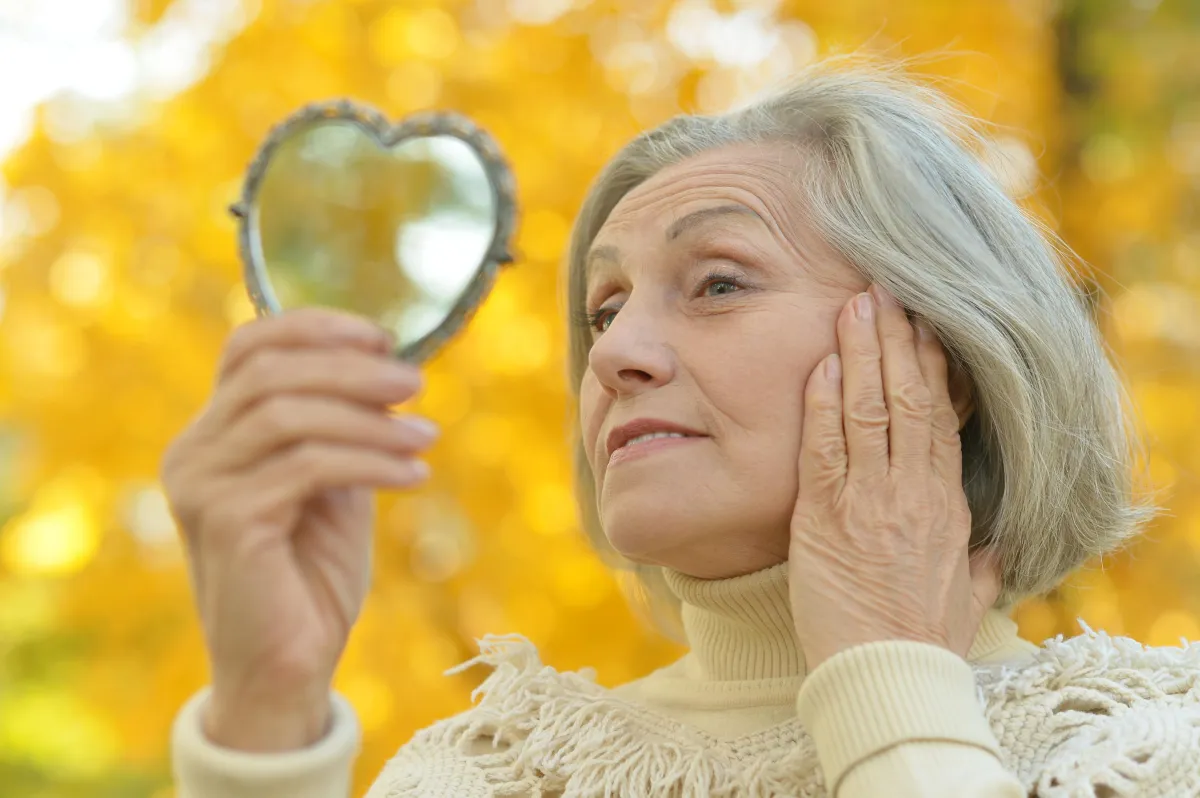Emerging Confidence Blog
Weekly inspiration to help you learn to trust yourself so you can build the life and career you want and earn the salary you deserve.

Unleashing Your Inner Goddess: A Journey to Body Positivity
Let’s face it: we've all had those moments where we catch a glimpse of ourselves in the mirror and think, "Whoa, is that what I really look like?"
Maybe you've even considered investing in a funhouse mirror to give yourself a more flattering reflection. But the truth is, we can't all be Barbie dolls - and thank goodness for that because life would be pretty boring if we all looked the same.
So instead of obsessing over our so-called imperfections, let's take a deep breath, grab a glass of wine, and explore the complex world of negative body image together.
Who knows, we might just learn to love our bodies for all their quirks and curves.
Let’s start by unpacking what negative body image is
We all have something about our appearance that we don’t love. For me, it’s crooked teeth. And that’s okay. When I talk about negative body image, I’m referring to a distorted perception of one's own body. In other words, this flaw is all you can see, and it impacts your self-worth and even how you talk to yourself. This perception is often characterized by negative thoughts, feelings, and attitudes about one's appearance. If you have a negative body image, you may be overly critical of your overall physical appearance, focusing on perceived flaws and imperfections. It may prevent you from social settings, stepping out of your comfort zone, speaking in public and many other things that are otherwise important to you.
It is difficult to know how many people suffer from negative body image because it is a complex issue that can affect people of all ages, genders, and backgrounds. However, studies suggest that negative body image is a common issue, particularly among women and adolescents. Just ask your friends!
According to a study published in the Journal of Eating Disorders, up to 60% of adults report dissatisfaction with their bodies. Among adolescents, rates of negative body image are even higher, with up to 80% of adolescent girls reporting dissatisfaction with their bodies.
And to be clear, I’m not just talking about weight. This could be anything about your appearance you dislike. I’ve heard women their height, their hair, and their skin (Because of things like acne, cellulite, rosacea, stretch marks and scars).
I just hate my hair; that’s not so bad--right?
Maybe or maybe not. It’s important to recognize the impact that negative body image can have on one's mental and physical health and to seek support from trusted friends, family members, or mental health professionals if needed.
Negative body image can lead to a variety of mental and physical health issues, including eating disorders, depression, anxiety, and low self-esteem. It is important to recognize the impact that negative body image can have and to take steps to promote a more positive relationship with your body, such as practicing self-compassion, surrounding yourself with positive influences, and seeking support from trusted friends or mental health professionals if needed.
Where it gets more concerned is when it becomes body dysmorphia which is a mental health disorder characterized by an obsessive preoccupation with one's appearance. People with body dysmorphia often engage in excessive grooming, checking their appearance repeatedly, seeking reassurance from others, and/or avoiding social situations altogether. This condition can have a significant impact on a person's quality of life, causing distress, anxiety, depression, and even suicidal thoughts in severe cases.
If you think this may be you, please seek professional treatment.
Where does all this negativity come from?
A negative body image is like that uninvited party guest who just shows up at your door without warning. It can come from a variety of sources. For example, unrealistic beauty standards promoted in the media, negative comments from family members or peers, or a traumatic event can all contribute to negative body image. It's important to recognize the various factors that can contribute to negative body image and take steps to promote a positive relationship with your body.
Some of the other sources include:
Cultural and societal norms: Our culture often promotes narrow standards of beauty and attractiveness, which can lead to unrealistic expectations and comparisons.
Family and peer relationships: Negative body image can be influenced by the attitudes and comments of family members, friends, or peers. This can include criticism or teasing about one's appearance or weight.
Personal experiences: Trauma, bullying, or other forms of discrimination can all contribute to negative body image.
Mental health issues: Mental health issues such as depression, anxiety, or obsessive-compulsive disorder can also contribute to negative body image.
Media exposure: Images in media such as advertisements, movies, and social media can promote unrealistic beauty standards and perpetuate negative body image.
Let’s pick that last one apart a bit, shall we? I’ve always said that I could look like a Victoria’s Secret Model, but I don’t want to work that hard…and I like food. But pick up any magazine or watch any commercial, and you’ll be shown a dozen reasons you don’t “measure up”.
Keep in mind that social media platforms often present curated and idealized versions of people's lives and bodies. This can lead to constant comparison and a sense of inadequacy when comparing one's own body to those presented on social media. And I always coach my clients never to compare your behind-the-scenes to someone else's highlight reels.
Social media can also be a platform for cyberbullying, which can lead to feelings of shame, anxiety, and depression related to one's body image. I have clients who are entrepreneurs who, while they know going live on social media is good for their business, hesitate to do so because “what will people think?”. I believe people will think what you have to say is so important they won’t care how you look.
It's important to recognize the impact that social media can have on negative body image and to be mindful of how much time you spend on social media and the types of content you consume. Surround yourself with positive influences and seek support from trusted friends or mental health professionals if needed.
Okay, fine! So what do I do?
Reframing the way you view your body can be a challenging but worthwhile process. Here are some tips that might help:
Practice self-compassion: Be kind to yourself and treat yourself as you would treat a friend. Instead of criticizing yourself for perceived flaws, try to focus on positive aspects of your body, such as its strength and resilience.
Challenge negative thoughts: When you have negative thoughts about your body, challenge them by asking yourself if they are accurate or helpful. Try to reframe negative thoughts into more positive ones.
Practice gratitude: Focus on the things your body allows you to do, such as walk, dance, or hug your loved ones. Take time to appreciate your body for all that it does for you. I’ve created a FREE 30-Day Body Gratitude Challenge that you can download here.
Find things you CAN change: Now this might seem contradictory after all the self-love you just read so hold on. If there are things you don’t like, change them. I know I carry more weight than I want to and I’m working with a health coach to change that. BUT, I’m not so preoccupied with my weight that it’s stopping me from doing what I love!
Surround yourself with positivity: Surround yourself with people who lift you up and make you feel good about yourself. Avoid social media accounts or websites that promote unrealistic beauty standards or make you feel bad about yourself.
Engage in positive self-care: Take care of yourself physically and mentally by engaging in activities that make you feel good, such as exercise, healthy eating, and getting enough rest.
Remember that reframing the way you view your body is a process, and it may take time and effort. Be patient with yourself, and know that it is possible to cultivate a more positive relationship with your body.
As my girl Lizzo would say, "Welcome to my body, I know it's nice to meet it".
emergingconfidence.com - All Rights Reserved - Terms & Conditions - Privacy Policy



